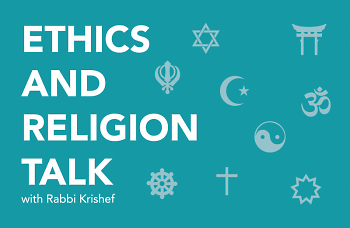Linda Knieriemen, a retired pastor of the Presbyterian Church (USA), responds:
Presbyterians name baptism and the Lord’s Supper (Eucharist, or Holy Communion) as sacraments because we see evidence in scripture that Jesus established and participated them. We do not believe that either is required for salvation but that they each are a “means of grace”. Participation in the Lord’s Supper is spiritually valuable because it connects us to other Christians when we receive the bread and wine (juice) together. It is, metaphorically, spiritual glue, bonding us to one another and to Christ.
Fred Stella, the Pracharak (Outreach Minister) for the West Michigan Hindu Temple, responds:
The closest word to sacrament we have in Hinduism is “Samskara.” Depending upon which movement within the Dharma one belongs, there can be as many as 16 during a lifetime. These ceremonies are performed to purify and sanctify individuals during various stages of life, such as birth, initiation, marriage, and death. They are considered essential for promoting spiritual and ethical values and guiding individuals through the different phases of life. Unlike Catholicism, divorce is not prohibited. That said, according to the latest Pew survey, Hindus in the US have a divorce rate of just 5%. Catholics clock in at 19%. Evangelical Christians top the charts with 33%. There are strong cultural and religious motivations for maintaining a marriage.
The Reverend Colleen Squires, minister at All Souls Community Church of West Michigan, a Unitarian Universalist Congregation, responds:
For Unitarian Universalists we view marriage as both a religious ceremony and a state or legal endeavor equally. Some of us might even call it a “Rite of Passage” but there are no official sacraments in UUism. We also believe in giving everyone the right to marry who they love. Finally, unlike the Catholic church our marriage ceremony can be performed anywhere, it does not need to be in a church.
The Rev. Sandra Nikkel, head pastor of Conklin Reformed Church, responds:
A sacrament is a visible, holy sign and a seal. Unlike the Catholic Church, the Reformed Church has only two Sacraments: Baptism and the Lord's Supper. Baptism is a visible sign and seal of our salvation and the Lord's Supper refers to the promise that Christ will continually nourish, strengthen, and comfort us. Whatever the sacrament may be, what needs to be clear is that they do not save. They simply are a visible sign of what already is. They represent the truth that we already know and possess. It is up to us to live lives that showcase the character of God, the love of Jesus, and the fellowship of the Spirit. "So that you may live a life worthy of the Lord and please him in every way: bearing fruit in every good work, growing in the knowledge of God." (Colossians 1:10).
Rev. Ray Lanning, a retired minister of the Reformed Presbyterian Church of North America, responds:
For Reformed and Presbyterian churches, the first test of a true sacrament is whether it was instituted in the church by the Lord Jesus Christ. We speak of the two “Dominical Sacraments” instituted by our Lord (Latin: Dominus), Christian baptism and the Lord’s Supper. Beyond these two, we do not acknowledge any other rites to be sacraments in the narrowest sense of the word, that is, a visible sign or action appointed by Christ to represent invisible graces and gifts. Or as I learned in Sabbath School, “an earthly sign with a heavenly meaning.” Oddly, in a throwback to the old religion, many Presbyterians still speak of marriage as “going to the altar,” although there are no altars in our churches.
Marriage was instituted by God for our first parents, Adam and Eve, in the Garden of Eden (Genesis 2:18-24). It is universal among humankind, and not specific to Christianity. It is “of the earth, earthy,” as the first Adam was (I Corinthians 15:47), and pertains only to this life. All marriages are for a stated time, “until death do us part,” as the Book of Common Prayer says, and not for eternity. Marriage itself will be abolished at the end of time, on the day of resurrection, according to Christ: “In the resurrection, they neither marry, nor are given in marriage, but are as the angels in heaven” (Matthew 22:30).
For Presbyterians, there is no requirement to be married in a church or by a minister of the church. Civil marriages are recognized as valid, and if the parties so desire, may be confirmed and blessed in a worship service. Dutch Reformed Christians follow the same practice in the Netherlands today; Christian couples have two weddings, one at the town hall and the other in church. In former days, American Christians were not married in church buildings, but in the home of their parents or in the manse or parsonage of their pastor.
This column answers questions of Ethics and Religion by submitting them to a multi-faith panel of spiritual leaders in the Grand Rapids area. We’d love to hear about the ordinary ethical questions that come up in the course of your day as well as any questions of religion that you’ve wondered about. Tell us how you resolved an ethical dilemma and see how members of the Ethics and Religion Talk panel would have handled the same situation. Please send your questions to [email protected].
The Rapidian, a program of the 501(c)3 nonprofit Community Media Center, relies on the community’s support to help cover the cost of training reporters and publishing content.
We need your help.
If each of our readers and content creators who values this community platform help support its creation and maintenance, The Rapidian can continue to educate and facilitate a conversation around issues for years to come.
Please support The Rapidian and make a contribution today.
